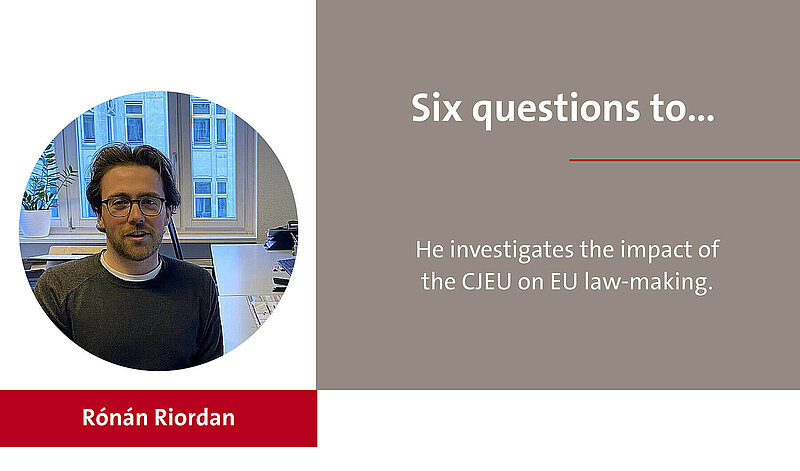
While Rónán Riordan has always appreciated the European Union, it is serendipitous encounters and chance friendships which put him on the path to pursue a research career on the EU. In his PhD project, he investigates the impact of the CJEU on EU law-making.
In our series "Six questions to...", we introduce the PhD students at the Jacques Delors Centre and their research projects and thoughts on the European Union. Rónán Riordan has started his PhD project at the Hertie School in 2020 and holds a stipend by the Jacques Delors Centre.
1. What is the main focus of your research?
My research aims to understand the influence of the Court of Justice of the European Union’s rulings on the way the EU designs its laws.
2. How did you end up working on the EU?
As an Irish person I have always appreciated the impact of EU membership on my home. We went from one of the poorest nations in Europe to one of its most prosperous in the space of a just a few decades, as our Celtic Tiger era shenanigans attest to. (Some people, with more money that sense, during the Celtic Tiger or the ‘Boom’ as we refer to it would fly to New York to do Christmas shopping for example). While I was raised - and I say this next bit with great fondness - in the middle of nowhere on the most westerly edge of one of Europe’s most westerly Island’s my home was full of people from all over the EU. So I was always aware of the European Union and valued our shared rights. This sparked my interest in International Politics and Sociology which I studied for my undergraduate in Dublin. During my Masters in Common Law my fascination with the EU deepened. Eventually I secured a role as a research assistant for a Professor who encouraged me to pursue my PhD which I had been considering for some time. So the answer to your question is that serendipitous encounters and chance friendships put me on this path, which is fitting as the EU is really a project with people at its core.
3. In your opinion, what is the most important issue the EU needs to solve?
There are many issues facing the EU, I think one issue close to my heart is the inclusivity of marginalised individuals and communities who perhaps don’t benefit from the EU the way you or I might. We need to demonstrate the relevance and benefits of EU cooperation to everyone, not just the few who benefit from free movement, and give everyone a feeling of ownership and connection to the project.
4. What is your favourite place in Berlin to relax after an intense work day?
Well, as I moved here during the pandemic I’m still figuring that out as everything has been closed. Normally I’d probably have found a bar where I could live up to the Irish stereotypes, but alas Covid has robbed me of even this. I enjoy biking around Berlin and along the Spree, but my colleagues here in Jacques Delors frequently express horror, followed promptly by confusion and serious concern, when they see me arriving into work wearing shorts during the Berlin Winters!
5. What is the research question you would really like to answer one day?
My PhD thesis would be a fantastic start!
6. How would you explain the EU to people?
Back in the old days European countries were ever so fond of fighting with one another until we eventually accepted what we already knew; fighting with our neighbours wasn’t really the best idea. To me the European Union is a manifestation of an old Irish proverb or seanfhocal; Ar scáth a chéile a mhairimíd – We live in the shadow of each other. While ‘Scáth’ means shadow it can also be translated as shelter, and so the proverb takes on a second interpretation; We live in the shelter of each other. Scáth therefore embracing a simple truth as to the duality of life; proximity brings reciprocal influence and interaction between people and nations. The EU is a group of countries that have made a choice to be one another’s source of prosperity and security because they recognise that they live in each other’s shadows and shelter. That is not to say the old rivalries between nations are redundant, they are alive and well, bubbling up to the surface during events like Eurovision (along with unnecessary dancing, unexplained props and some terrible song lyrics). We no longer go to war with our neighbours, we say ‘Nul Points’. The EU isn’t faultless, it is flawed and imperfect, but isn’t it better to be subjected to questionable outfit choices once a year than a war every few decades?
